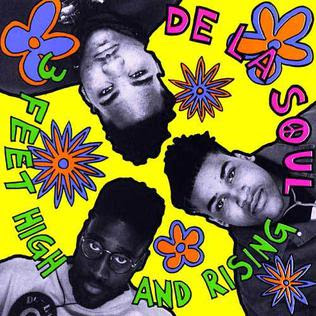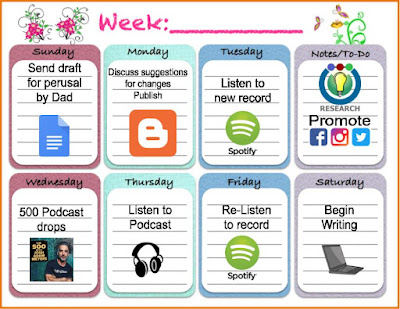I was inspired by a podcast called The 500 hosted by Los Angeles-based comedian Josh Adam Meyers. His goal, and mine, is to explore Rolling Stone Magazine's 2012 edition of The 500 Greatest Albums of All Time.
Album: # 346
Album Title: 3 Feet High And Rising
Artist: De La Soul
Genre: Alternative Hip Hop, Progressive Rap, Jazz Rap, Psychedelic Hip Hop
Recorded: Calliope Studios, New York and Island Media Studios, West Babylon
Released: March, 1989
My age at release: 23
How familiar was I with it before this week: Not At All
Song I am putting on my Spotify Playlist: (Not Available On Spotify) - Amended, December, 2024 - Me, Myself and I added.
On a weekly basis over the past two years, I have written more than 150 articles on records listed on the 2012 edition of Rolling Stone Magazine's roster of The 500 Greatest Albums Of All Time. As one might expect, a routine has formed. This week was different -- and my routine was thrown. 3 Feet High And Rising by Long Island, New York, hip-hop artists, De La Soul, is not available on Spotify, or any streaming service. I found the music at this link on YouTube, but this option was far less convenient and made me wonder: Why isn't the record on Spotify?
The story of De La Soul's absence from streaming services goes much further back than I assumed. The iconic hip-hop trio's first six records, including this debut, have been embroiled in a legal battle with their first label, Tommy Boy Records, for many years. The issue is thorny. According to Variety writer Jem Aswad, the debut record was a "pioneering event, not just in the world of hip-hop, but also in sampling technology". Sampling, a foundation of hip-hop, is the re-use of a sound recording to create a new recording. The "sampled" section usually consists of a popular part of the record (the rhythm, melody, speech or an entire bar of music) that can be repeated, or looped, over and over again.
Sampling has its origins in the dance clubs and house parties of the late 70s and early 80s. The disc jockey (DJ) would use two turntables with the same recordings on each. Typically, he would find a "musical break" and, by switching between the records, he could play a "danceable" section repeatedly -- one record played while the DJ skillfully reset the other record to the start of the break. |
| Legendary, pioneering DJ Grandmaster Flash in NYC (1980) |
Initially, DJs preferred soul, funk and R&B records for samples which were played at live events. However, as hip-hop music grew in popularity through the 80s, two things happened. First, the records were made in a studio, where time and improved technology enhanced and streamlined sampling. Additionally, new artists began to look for different sources, other than lesser-known or forgotten R&B records, for their sampling products. 3 Feet High And Rising features recognizable samples from well-known songs. The upbeat love song Eye Know has guitar and horn samples from Make This Young Lady Mine by The Mad Lads (1960), the distinctive whistle from Otis Redding's (Sittin' On) The Dock Of The Bay (1967), guitar keyboard and vocal samples from Steely Dan's Peg (1977) and drums from Lee Dorsey's Get Out Of My Life, Woman (1966). |
| Eye Know - single release from 3 Feet High And Rising - De La Soul |
Unfortunately, many of the samples used by De La Soul had not been "cleared" by Tommy Boy Records' legal department. Consequently, copyright laws, which had been hastily rewritten in the 1980s, were deemed breeched. Lawsuits followed the release of 3 Feet. For example, The song, Transmitting Live From Mars features a sample from You Showed Me by The Turtles. The notoriously litigious songwriters, Howard Kaylan and Mark Volman, eventually settled for a reported $1.7 million.
 |
| Kaylan (left) and Vollman of The Turtles |
Thirty years later, the problems persist. When Tommy Boy Records approached the group about releasing their catalogue to four music streaming or sales services (Spotify, Apple Music, iTunes and Tidal), they offered the trio a paltry 10% of the new revenue. In a series of Instagram posts from 2019, the group made their position known. They were willing to re-negotiate the terms of the deal, but talks broke down.Verified
"Well friends, after 30 years of profiting from our music and hard work... and after 7 long months of stalled negotiations, we are sad to say that we’ve been unable to reach an agreement and earn Tommy Boy’s respect for our music/legacy...Therefore, our catalog will not see the light of day by way of our involvement or consent. This means, if you see De La Soul music/albums available for streaming or purchase anywhere, BE AWARE, all parties involved WILL profit but De La Soul WILL NOT benefit or earn deservedly/fairly. We really tried."
I am of two minds when it comes to Spotify. I love having easy access to so such a large catalogue of music for the reasonable price of $10 a month. In the 80s, I would spend nearly $100 a month on vinyl and close to $200 a month on Compact Discs through the 90s and into the 2000s. Consequently, my subscription to Spotify feels like a savings. I love making playlists, particularly for my classroom, and access to this streaming service has made my journey through The 500 immeasurably easier. However, I also fret a little. Am I part of this problem? Am I contributing to the coffers of wealthy record companies, while a fraction of my subscription fee trickles down to the artists?
For more information, I reached out to my friend Glen "Archie" Gamble. You may remember him from his guest blog on Album #415, the debut record from Van Halen. His former band, Buffalo Brothers, have their record, Magic Incinerator, streaming on Spotify. All 11 tracks have had hundreds of streams and Archie has not seen a cent. According to him, the publishing company would receive those royalties:
"We’ve never been consulted or told anything. SOCAN (Society of Composers, Authors, Music Publishers of Canada) might collect it on our behalf, I don’t know."
How annoying for artists to know their material is finding an audience and that someone else is making most of the profit.
So, my weekly routine was thrown. As I type this, it is Sunday morning and I am doing a final draft of this writing. 3 Feet High And Rising is playing in the background (on YouTube, not Spotify). I am keen to follow the De La Soul streaming story as it unfolds. Will the result be a harbinger of positive change for recording artists?
As the saying goes, "It's called show business for a reason...without the business, there is no show. But, without the show, there is no business."









No comments:
Post a Comment